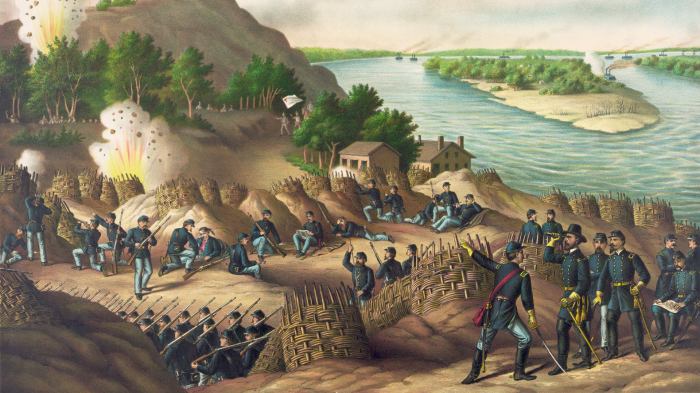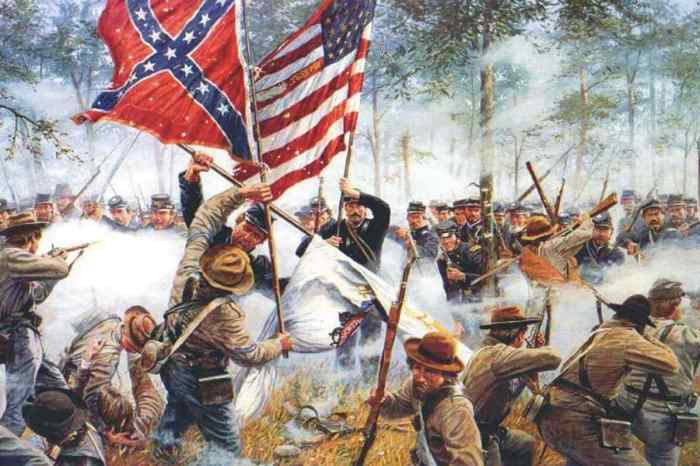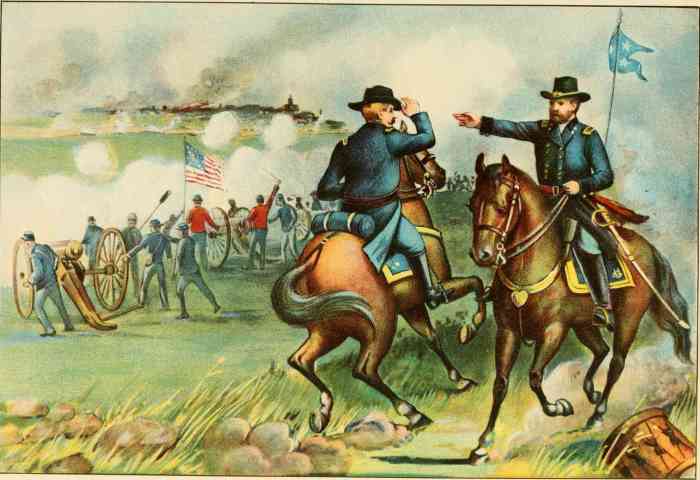The Battle of Vicksburg APUSH definition encapsulates a pivotal clash in the American Civil War, shaping the course of the conflict and leaving a lasting impact on the nation. This battle of strategic significance tested the mettle of both Union and Confederate forces, ultimately altering the balance of power and contributing to the eventual outcome of the war.
The strategic importance of Vicksburg, Mississippi, as a key stronghold along the Mississippi River, set the stage for this intense struggle. The Union’s determination to capture Vicksburg aimed to sever Confederate supply lines and isolate their forces in the western theater.
Conversely, the Confederates recognized the criticality of holding Vicksburg to maintain control of the river and hinder Union advances.
Overview of the Battle of Vicksburg

The Battle of Vicksburg was a pivotal conflict in the American Civil War that took place from May 18 to July 4, 1863. The Union victory at Vicksburg was a major turning point in the war, as it gave the Union control of the Mississippi River and split the Confederacy in two.
Vicksburg was a strategically important city for both the Union and Confederate armies. It was located on the Mississippi River, which was a vital transportation route for the Confederacy. If the Union could capture Vicksburg, they would be able to cut off the Confederacy’s access to the river and effectively split the Confederacy in two.
Key Events of the Battle
The Battle of Vicksburg began with a Union siege of the city. The siege lasted for six weeks, during which time the Union forces slowly tightened their grip on the city. The Confederate forces, led by General John C. Pemberton, were unable to break the siege and were forced to surrender on July 4, 1863.
The Union victory at Vicksburg was a major turning point in the Civil War. It gave the Union control of the Mississippi River and split the Confederacy in two. The victory also boosted the morale of the Union forces and helped to pave the way for the eventual Union victory in the war.
Impact of the Battle
The Battle of Vicksburg had a significant impact on the course of the Civil War. The Union victory gave them control of the Mississippi River, which was a vital transportation route for the Confederacy. This effectively split the Confederacy in two and made it much more difficult for the Confederate forces to communicate and supply their troops.
The Union victory at Vicksburg also boosted the morale of the Union forces and helped to pave the way for the eventual Union victory in the war. The victory showed that the Union was capable of winning major battles and that the Confederacy was not invincible.
Leaders and Commanders, Battle of vicksburg apush definition
The Battle of Vicksburg was fought between the Union Army, led by General Ulysses S. Grant, and the Confederate Army, led by General John C. Pemberton.
Ulysses S. Grant was one of the most successful generals in the Civil War. He was known for his aggressive tactics and his ability to win battles against overwhelming odds. John C. Pemberton was a Confederate general who was known for his defensive tactics.
He was unable to break the Union siege of Vicksburg and was forced to surrender the city on July 4, 1863.
Legacy of the Battle
The Battle of Vicksburg is remembered as one of the most important battles in the Civil War. It was a major turning point in the war and helped to pave the way for the eventual Union victory. The battle is still studied by historians today and is considered to be one of the best examples of military strategy and tactics in American history.
Clarifying Questions: Battle Of Vicksburg Apush Definition
What was the strategic significance of the Battle of Vicksburg?
Vicksburg’s location along the Mississippi River made it a crucial stronghold for controlling Confederate supply lines and hindering Union advances.
Who were the key generals involved in the Battle of Vicksburg?
Ulysses S. Grant led the Union forces, while John C. Pemberton commanded the Confederate army.
What was the outcome of the Battle of Vicksburg?
The Union victory at Vicksburg weakened the Confederacy and strengthened the Union’s position, contributing to the eventual outcome of the war.

